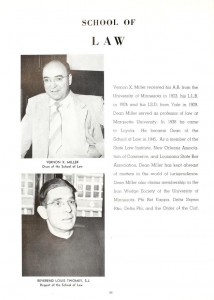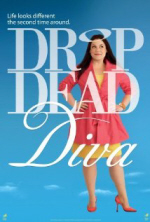 Who was the first Marquette University law professor to have clerked for a justice on the United States Supreme Court? (Hint: the answer is not current dean Joseph Kearney.) Who was the first, and only, Marquette law professor ever elected president of the Association of American Law Schools? Who was the only Marquette Law Professor to have studied at Yale Law School during the heyday of legal realism and to be described by legendary Yale law professor Myres McDougal as a “confirmed American legal realist”? (Hint: Not David Papke.) Who was the second Marquette law professor to become dean of the law school at Catholic University in Washington, D.C.? (Hint: John McDill Fox was the first.) And finally, who was the first Marquette law professor to have been widely recognized as a leading national figure in the field of torts? (Hint: Jim Ghiardi was the second.)
Who was the first Marquette University law professor to have clerked for a justice on the United States Supreme Court? (Hint: the answer is not current dean Joseph Kearney.) Who was the first, and only, Marquette law professor ever elected president of the Association of American Law Schools? Who was the only Marquette Law Professor to have studied at Yale Law School during the heyday of legal realism and to be described by legendary Yale law professor Myres McDougal as a “confirmed American legal realist”? (Hint: Not David Papke.) Who was the second Marquette law professor to become dean of the law school at Catholic University in Washington, D.C.? (Hint: John McDill Fox was the first.) And finally, who was the first Marquette law professor to have been widely recognized as a leading national figure in the field of torts? (Hint: Jim Ghiardi was the second.)
The answer to all of these questions is, of course, Vernon X. Miller.
Miller was born in 1902 in St. Paul, Minnesota. He attended college and law school at the University of Minnesota where he earned both a bachelor’s degree (1923) and a law degree (1925), as well as membership in Phi Beta Kappa and Order of the Coif. He also served as editor-in-chief of the Minnesota Law Review.
After law school, Miller clerked for Minnesota-native (and fellow Roman Catholic) Pierce Butler of the United States Supreme Court. After his clerkship, he returned to the Twin Cities where he worked for the Minnesota Crime Commission and taught as a law professor at St. Thomas College (1926-28). He then spent a post-graduate year at Yale Law School during the heyday of the legal realism movement. (At Yale, he overlapped as a fellow with the above-mentioned McDougal and they remained friends for the rest of their lives.) As a graduate law student, he earned a perfect 4.0 grade point average and received a J. S. D. degree in 1929.
After receiving his Yale degree, Miller returned to teaching at St. Thomas for one year and then practiced law with the Minneapolis firm of Rockwood & Mitchell. In 1930, he joined the faculty of the University of Oregon as an associate professor of law, but he remained at Oregon for only one year, leaving in the fall of 1931 to join the Marquette Law School faculty as a full professor.
At the time of his appointment, the Marquette Law School was led by Dean Clifton Williams, who had assumed the deanship in 1927, following the tragic death of his friend and law partner, Dean Max Shoetz. The AALS Directory of Law Teachers for 1937 lists Miller as a member of a 15-man law faculty, although only a handful of the group taught law full-time. Over the next seven years, Miller taught a wide array of courses, including Torts, Bills and Notes, Conflicts of Law, Agency, Personal Property, Real Property, Equity, Introduction to the Study of Law, Corporations, Damages, Insurance, Partnership, Common Law Pleading, Sales, Securities, Creditor’s Rights, and Corporate Reorganization.
Miller left Marquette after the 1937-1938 academic year to join the faculty at Loyola of New Orleans. The reason for his departure does not appear to have been recorded. He was replaced on the faculty by Otto Reis, a Harvard Law School graduate who had previous taught for a number of years at Creighton University. (Miller’s departure was noted in the 1939 Hilltop, the university yearbook, a publication that normally did not provide much coverage of the law faculty.) Whether or not his departure involved his relationship with new dean Francis Swietlik is not clear, although both major scholarly figures on the faculty, Miller and Carl Zollman, both departed at the end of the 1930’s, and issues with Swietlik seemed to have clearly affected Zollman’s decision to step down from the faculty.
Miller remained at Loyola-New Orleans for 13 years, serving as dean from 1945-1951. Following his time at Loyola, he moved to the University of San Francisco, where he was dean of the law school from 1951-1954, and from San Francisco, he moved to Washington D.C.’s Catholic University Law School. At Catholic, he served as Dean until 1968, and became widely recognized as a leading figure in American legal education. He stepped down as dean in 1968, but he remained on the Catholic faculty until 1972. His final year of full-time teaching was spent as a visiting professor at McGeorge Law School in California in 1972-1973. After his retirement, he continued to teach at Catholic as an emeritus professor until 1982.
Miller authored two books on Tort Law and many articles on topics related to law and legal education. He was particularly prolific when it came to legal issues involving trains. He was also an avid reader of lawyer related fiction and a great baseball fan.
In addition to serving on a wide array of public commissions, Miller served as Secretary-Treasurer of the Association of American Law Schools in 1962 and 1963, and in 1965, he was the president of that organization. He was also a long-time member of the American Bar Association’s Committee on Legal Education and Admission to the Bar.
Miller died at age 83, at his home in Maryland in February, 1986, nearly a half century after his time at Marquette. His papers currently reside at the University of Illinois, but they unfortunately contain virtually nothing about his Marquette years.
 [Editor’s Note: This month, we asked a few veteran faculty members to share their reflections on what has changed the most in legal education since they became law professors. This is the sixth and final entry in the series.]
[Editor’s Note: This month, we asked a few veteran faculty members to share their reflections on what has changed the most in legal education since they became law professors. This is the sixth and final entry in the series.]

 First, pop culture lawyers were heroes. Then, pop culture lawyers were devils. These two extremes capture most of what the world sees of lawyers—they are either pursuers or destroyers of justice based on the angle of perception or bias. However both of these extremes leave out a major aspect of every real American lawyer: their humanity.
First, pop culture lawyers were heroes. Then, pop culture lawyers were devils. These two extremes capture most of what the world sees of lawyers—they are either pursuers or destroyers of justice based on the angle of perception or bias. However both of these extremes leave out a major aspect of every real American lawyer: their humanity.